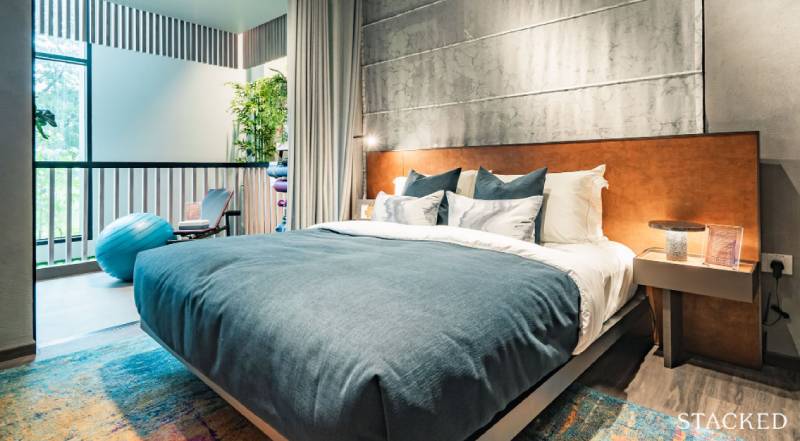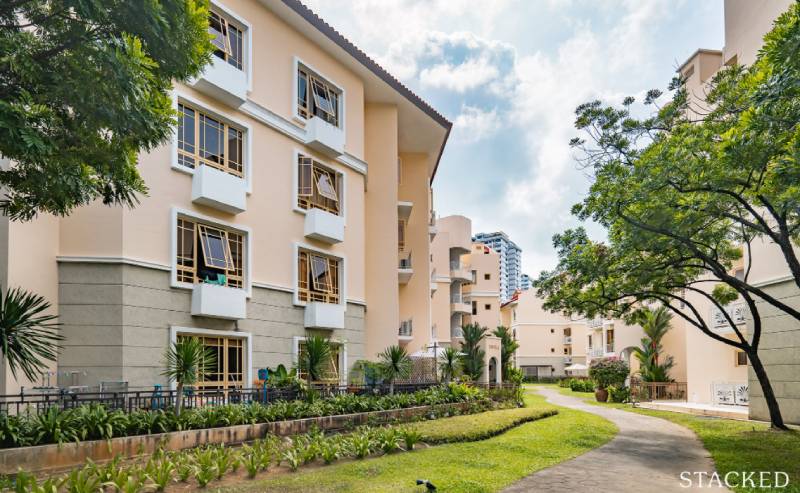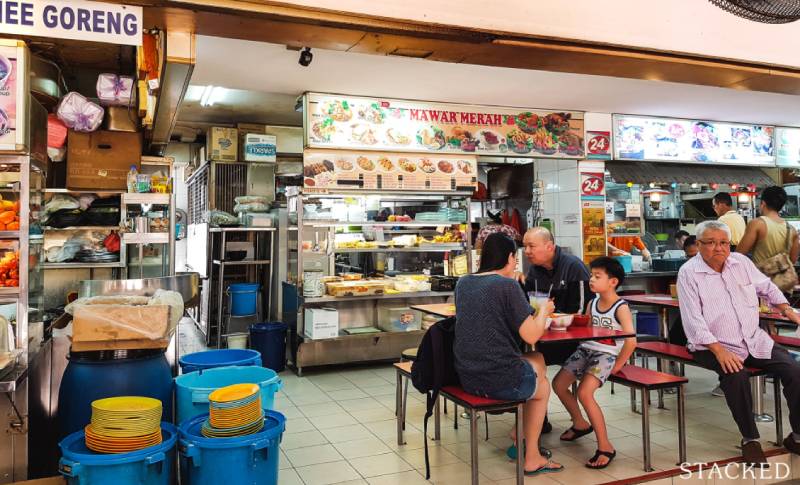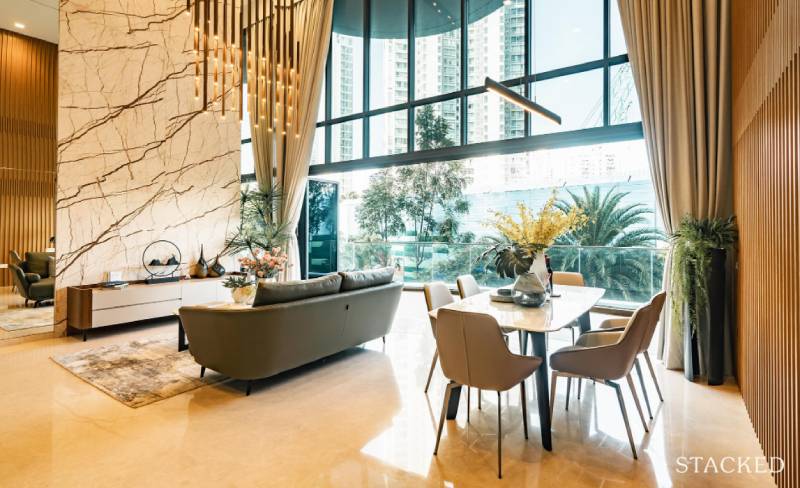Past your mid-40s and buying a property? Here are 5 things you must know

Perhaps you’re starting your homeownership journey late; or you’ve reached that stage in life where you’re ready to upgrade (or maybe even downgrade). Whatever the case, buying homes when you’re older takes a whole different approach. You’ll find that, compared to younger home buyers, you face tighter restrictions, and need different amenities. The following will help you make the right decisions:
The LTV ratio is the percentage of the sale price or valuation (whichever is lower), that you can borrow. As of 2022, the maximum LTV from a bank loan is 75 per cent of the property, whilst the maximum LTV from HDB is 85 per cent.
However, it’s not as straightforward for older buyers. If your loan tenure would last beyond the age of 65, your LTV will be decreased to 55 per cent. In addition, the first 10 per cent of your property has to be paid in cash.
Consider, for example, a buyer who is upgrading from an HDB flat to a condo at the age of 48.

The condo costs $1.5 million, which usually means the minimum down payment is just $375,000 (of which $75,000 must be in cash, and $300,000 can be from cash or CPF).
So assuming this buyer sells their flat and has at least $375,000 leftover (and at least $75,000 is in cash), upgrading would be straightforward.
[[nid:565321]]
However, what if our buyer wants a loan tenure of 20 years? This would take them to the age of 68. This then means that their LTV drops to 55 per cent.
Now they would need $675,000 for the down payment, of which a whopping $150,000 has to be in cash.
This isn’t practical for most buyers, who will have to shorten the loan tenure. So in the above example, the buyer might have to take a 17-year loan, instead of a 20-year loan.
Remember that the shorter the loan tenure, the higher the loan repayment. For example, a loan amount of $1.125 million (the maximum for a $1.5 million condo), at 1.3 per cent per annum, would come to repayments of around $5,326 per month over 20 years.
Shortened to 17 years, monthly repayments would rise to about $6,150.
As such, older home buyers may be forced to choose between a higher down payment, or higher monthly loan repayments. You may want to speak to a qualified financial professional, to work out which approach works better for you.
If you’re past your mid-40’s, how much longer will you need the property for?
If you plan for a realistic life expectancy, it’s improbable that you need a remaining lease of more than three or four decades. So if your sole intent is to live out the rest of your days in the property, it could make sense to buy an older leasehold home (the size of your living space generally would be better too).

The price difference between a leasehold and freehold property can be as much as 15 to 20 per cent. Between a $1.5 million freehold condo, and a $1.275 million leasehold condo, you’re looking at around $250,000 that can go into a more pleasant retirement.
Now at this point, many Singaporeans jump in and exclaim “But I want to leave the property to my children!”
Fair enough, legacy planning is a big part of Asian culture. But take a step back, and consider if investing that extra $250,000 elsewhere could yield more for your children. Remember that, as far as a 'roof over their heads' go, Singapore has a homeownership rate of over 90 per cent. There’s a high chance your children will have their own homes already, by the time they’re past their mid-30’s.
READ ALSO: Is Kopar @ Newton or Fourth Avenue Residences a better choice for 2-bedroom unit?
So while a freehold property is a more viable investment for legacy planning, remember to compare other options as well. Leasehold isn’t always a bad deal, even an older leasehold unit.
That said, if you’ve made the decision for an older leasehold condo to be your final home, do also consider the en-bloc viability of the place. While for most people having a windfall from a collective sale will be a jump for joy moment, having to move homes when you are in your 70s may not be worth the trouble for others. So if you are in the latter camp, looking for developments that have a low chance of en-bloc could even be a factor to consider.
At this stage in your life, you have a clearer picture of your twilight years; and it may be quite different from what you wanted in your youth.
Now if you have very high aspirations for your retirement (e.g., 100 per cent income replacement, round-the-world trips, retiring in major capitals like London or New York), then the end goal probably will involve selling an appreciated property.
However, if your expectations are more modest, you can plan for something other than downgrading. We all know moving house is a real pain; well, it gets worse when you have to do it in your late 60s or 70s.

Time again, we’ve seen older Singaporeans who thought they’d sell and move to a smaller home when they got older. But they get distressed when they realise all their friends, regular coffee shop hangouts, transport routes, will all have to be reshuffled.
Just in case this happens, you’ll want to stay in the know about options like the Lease Buyback Scheme (for flats), or reverse mortgages (for private property. These are not the same as the terrible deals you hear about overseas, check the link for details).
These options allow you to monetise your property for retirement, without having to sell and move. Knowing about them ahead of time will help you to make better decisions. You might, for instance, be able to move straight into an area you love, without having to downgrade and move there later in life.

It’s a sad fact that we don’t stay in shape forever. A unit like a walk-up apartment, or multi-storey terrace house may seem cool right now; but it will be a figurative and literal pain once you’re older.
Do consider how you’re going to clean and maintain the property on multiple floors, when you reach your late 70s or 80s. Apart from being tiring, stairs also pose something of a safety hazard, to both children and the elderly.
The impracticality of stairs can end up necessitating a sale later on, even after you’ve grown used to the area (see point 3). It may be best to plan ahead, and avoid a move later in life.
If you still hanker after having a home with two floors for privacy reasons, perhaps looking for a property with lift access to both floors will be a smart bet. While these are few and far between (at least, at a more palatable price point), the good part is TJ has two very useful lists for you to consider. (The Property Unicorn Part 1, and Part 2).
Most Singaporeans will go for the biggest possible unit they can buy; but don’t be too quick to follow. There are reasons why buyers in their mid-40’s may want to get a smaller home than they can afford.
READ ALSO: Storage with style: Interior design hacks to maximise space in your small home
The first factor is the age of your children. Unless you plan on them staying with you forever, most of the time, they’re going to move out someday. Many older couples overlook this, and buy humongous, 2,000+ sqft units; then their children move out in a decade or less, and many bedrooms stay empty.
(Yes, you could rent them out, but many couples end up unable to bear the loss of privacy).
The second reason is maintenance. By this, we refer to both the difficulty of keeping the place clean, and the maintenance fees.
Maintenance fees for condos don’t stop. Even years after you’ve made the final loan repayment, you’ll still be paying around a thousand dollars a quarter (for most mass-market condos).

Now the bigger your unit, the higher its share value and the higher your monthly maintenance. So buying a huge unit could mean paying more every month for no good reason, if your children have flown the nest.
In general, older home buyers should be aware that saying they’ll “rent out” spare rooms or “downgrade to a smaller unit” makes sense right now; but in practice, it can be uncomfortable to execute later.
The ultimate tip to keep in mind — if you’re past 45 — is to choose a home with the possibility you’ll stay there for the rest of your life, even if you currently have different plans. Life circumstances and preferences change every year — and you want a home that you’re happy in and can afford, should it become impractical to move later.
ALSO READ: Should you rush through your home loan repayment before interest rates rise?
This article was first published in Stackedhomes.